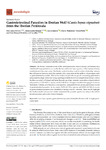Gastrointestinal Parasites in Iberian Wolf (Canis lupus signatus) from the Iberian Peninsula

Use this link to cite
http://hdl.handle.net/2183/38605Collections
- Investigación (FCIE) [1240]
Metadata
Show full item recordTitle
Gastrointestinal Parasites in Iberian Wolf (Canis lupus signatus) from the Iberian PeninsulaAuthor(s)
Date
2023-01-01Citation
Pereira, A.L.; Mateus, T.L.; Llaneza, L.; Vieira-Pinto, M.M.; Madeira de Carvalho, L.M. Gastrointestinal Parasites in Iberian Wolf (Canis lupus signatus) from the Iberian Peninsula. Parasitologia 2023, 3, 15-32. https://doi.org/10.3390/parasitologia3010003
Abstract
[Abstract]: The Iberian Peninsula is one of the most humanized areas in Europe, yet humans may cohabit with large predators, such as the Iberian wolf (Canis lupus signatus), at the expense of many contributions to its conservation. The limited wolves’ territory leads to a close relationship between this wild species, humans, and other animals, which may promote the spillover of pathogens, such as gastrointestinal parasites. This review intends to provide an update concerning gastrointestinal parasite findings performed using coprological methods on fecal samples from Iberian wolves. Studies conducted in Portugal and Spain through coprology presented a prevalence of gastrointestinal parasites of 57.0–100% in Spain and 21.5–68.3% in Portugal. Parasites belonging to Protozoa, Trematoda, Cestoda, and Nematoda were specified, alongside thirteen genera and twenty species of gastrointestinal parasites. In this study, 76.9% (10/13) of genera and 65.0% (13/20) of species of gastrointestinal parasites were identified as having zoonotic potential. These results highlight that further studies are needed to better understand the parasitic agents circulating in the wild in humanized areas, such as the Iberian Peninsula.
Keywords
Canis lupus signatus
Gastrointestinal parasites
Helminths
Iberian wolf
Portugal
Protozoans
Spain
Gastrointestinal parasites
Helminths
Iberian wolf
Portugal
Protozoans
Spain
Editor version
Rights
© 2023 by the authors. Licensee MDPI, Basel, Switzerland. This article is an open access article distributed under the terms and conditions of the Creative Commons Attribution (CC BY) license (https://creativecommons.org/licenses/by-nc/4.0/).
ISSN
2673-6772





